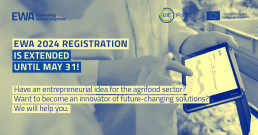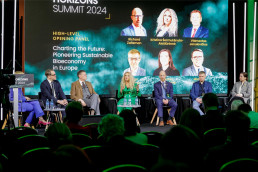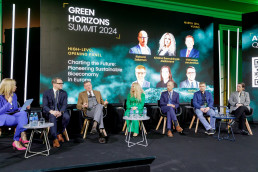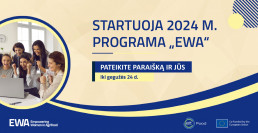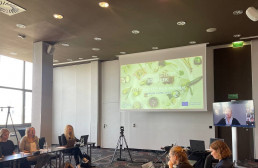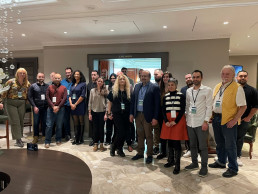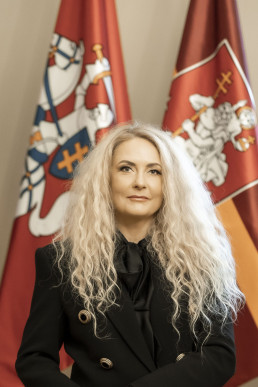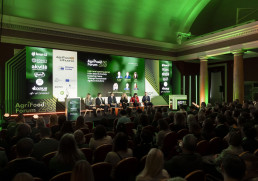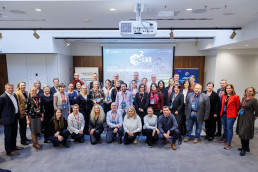EWA 2024: participants should be motivated by more than just the prize money
EWA, a free programme that promotes women’s entrepreneurship and the potential to develop innovative solutions for the future of agrifood, is returning to Lithuania. It is an EIT Food initiative supported by the European Institute of Innovation and Technology (EIT), an EU institution. The project will be launched for the third time and will be coordinated by AgriFood Lithuania. The success of last year’s mentees is a testimony to the fact that it is possible to commercialise an idea within six months with mentors’ help and gain valuable experience. So even those with only a vision for the business are invited to apply before 31 May.
Call for early-stage startup founders
The organisers have good news for women who are planning to participate in the programme as owners of existing businesses. This year, you can apply if you have a startup that has been on the market for up to three years (instead of the previous requirements of two years). A startup may also have received double the amount of funding from private or public funds than in previous EWA years - that is, up to €60,000.
“The expectations for innovative ideas of the participants remain the same: we hope to see ideas that have the potential to positively impact the food system, improve the quality of people’s lives, or contribute to a more sustainable and efficient use of our planet’s resources,” comments Kristina Šermukšnytė-Alešiūnienė, CEO of the AgriFood Lithuania cluster and the digital innovation hub, patron of EWA Lithuania.
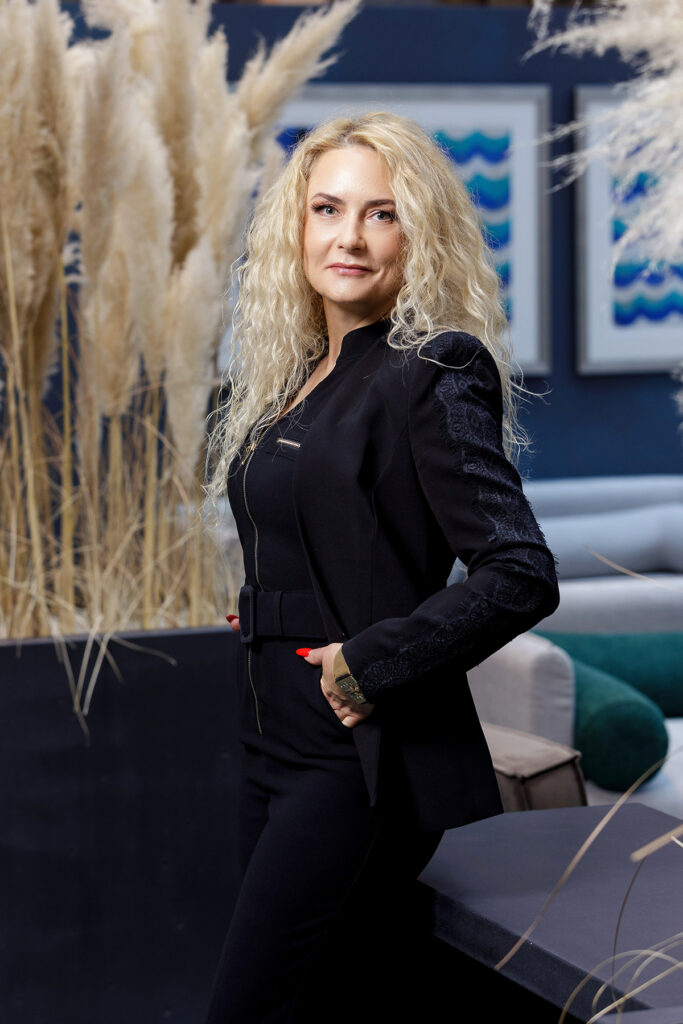
The top 10 most promising young entrepreneurs selected by EIT Food will work individually with their assigned experienced mentors for six months, taking part in face-to-face and virtual seminars and training sessions. They will also have the opportunity to actively benefit from international networking opportunities within the world’s largest and most dynamic food innovation community.
In autumn, the EWA will hold its final event at the traditional international AgriFood Forum, which annually attracts an audience of nearly 3000 people. Female innovators will take part in a pitch competition, watched by business angels and potential investors from all over Europe. The three best performers will be selected by an expert jury based on their startup idea and the progress they have made over the last six months. The winner will be awarded €10,000, while the second and third-place winners will receive vouchers of €5,000 and €3,000.
Women’s leadership as a way to achieve positive change
K. Šermukšnytė-Alešiūnienė points out that a lack of determination is one of the main reasons preventing women from pursuing a career in agrifood. According to official EU data, men apply for a senior position by meeting only 30% of the requirements, while women doubt themselves even if they do meet 70%.
“However, they have the potential to make a substantial contribution to strategic goals such as reviving Europe’s depopulated regions. Agriculture and the food industry are the main economic activities of women in many remote areas. Also, females have an instinctive ability to foster the well-being of their communities. But we need to empower them to be entrepreneurs and promote creative, sustainable innovation that responds to the challenges affecting food systems and the planet in general,” says the agrifood industry expert.
Tools for personal and professional development, more self-confidence, professional support and belonging to the EIT Food network - these are the values of the EWA, which K. Šermukšnytė-Alešiūnienė identifies as the key to success for women innovators in the creation of innovative startups.
All you need is an idea you strongly believe in
The experiences of EWA mentees and the evidence that all women have a chance to shine should encourage others to participate. For example, Giedrė Kesiūnaitė, an innovator taking her first steps, won in 2021. She started the project with an idea and finished with a seitan-based alternative meat product.
A year later, the business launch initiative brought extraordinary success for Paulina Gruodienė, the creator of Fruttberry, who also joined the programme with just the hint of an idea. She says that her dream to create powdered mixtures of vegetables, fruits, and berries, which can be prepared in half a minute and have no alternative in Lithuania, was born out of a personal need to live a healthier lifestyle.

“I did not become a finalist, but I consider my decision to participate in EWA as a fateful one, because today, together with my business partner, we are growing a responsible brand that generates revenue and is of interest not only to local consumers but also to foreign markets. The reason for this is a sincere belief in my own idea, daily nurturing of it during the programme period, and dedication to the goal after it is over,” shares P. Gruodienė and offers not to focus only on the prize fund.
Finance, she says, is definitely very necessary at the start of a business. However, the advice of mentors who are professionals in their field, the practical knowledge and skills that are 100% transferable to a young business every day, as well as the supportive and inspiring community are all invaluable assets.
K. Šermukšnytė-Alešiūnienė: “Youth and women – among the key pillars of future bioeconomy”
Holistically transforming the bioeconomy sector to harmonize sustainability with economic and environmental goals – this was the core focus of the insights shared at the Bioeconomy Forum 2024 held in March. Industry professionals, policymakers, academics, business and NGO representatives as well as young innovators from Lithuania and abroad exchanged their perspectives at the Vilnius Town Hall. Over 2,000 participants from across the EU, both in-person and online, joined the event, eager to collaboratively shape the future.
The forum was organized by the cluster and digital innovation hub AgriFood Lithuania and the Research Council of Lithuania, in collaboration with the Ministry of Economy and Innovation, the Ministry of Agriculture, the Innovation Agency, LithuaniaBIO, and Invest Lithuania. The event was part of the Europe-wide Bioeconomy Changemakers Festival, initiated by the European Commission's Directorate-General for Research and Innovation, in cooperation with youth ambassadors in the bioeconomy sector.
Greetings from the EU Commissioner
Opening the forum, Virginijus Sinkevičius, the European Commissioner for Environment, Oceans, and Fisheries, expressed support for the country's commitment to finding ways to strengthen the sector. According to him, the bioeconomy offers sustainable opportunities for innovation in agriculture, forestry, and rural areas, enabling income diversification, cost reduction, and increased resilience.
“In the pursuit of transformation, the primary goal must remain sustainability – biomass resources are limited, so we must manage them very carefully both on land and at sea. And let's not forget to involve the youth in any processes, whose creativity and energy will be crucial in driving innovations, especially in revitalizing remote areas,” shared V. Sinkevičius in his welcoming remarks.
Lithuania's Minister of Agriculture, Kęstutis Navickas, emphasized that bioeconomy is a very broad field, and we must harness as many competencies and unconventional solutions as possible to successfully implement specific aspects: “Creating added value from our own production, rather than being a country of raw materials, is one of the key goals we should actively pursue.”
According to the Lithuanian Vice Minister of Economy and Innovation, the challenges faced daily by EU member states are very similar, so we can only solve them together. With these words, Ieva Valeškaitė encouraged the international, interdisciplinary audience to share best practices and seek productive forms of teamwork.
“The national bioeconomy sector already accounts for 7.5% of the total GDP, and we can further harness its potential. For example, by expanding R&D&I activities that ensure collaboration between science and business in the private sector and the growth of human resource competencies,” the speaker commented on the ministry's contribution.
Towards a sustainable European bioeconomy – inclusive and with a unified strategy
Kristina Šermukšnytė-Alešiūnienė, CEO of AgriFood Lithuania, welcomed event participants and called for the exploration of new bioeconomy definitions during the high-level opening discussion. She encouraged sharing ideas on how to integrate these definitions into each related sector. According to her, fostering the growth of young talents and ensuring women's leadership would not only create a fairer society in terms of equality and inclusion but also drive progress in the bioeconomy.
“Young people and women are among the strongest pillars that will help lay the foundation for a greener tomorrow, where dynamic, diverse, and innovative businesses thrive. Undoubtedly, sustainability and responsible resource use should also be considered as potential strengths and competitive advantages for companies. Organizations that implement these principles will not only gain consumer support but also open doors to new markets,” emphasized Kristina Šermukšnytė-Alešiūnienė.
Other key insights from the first panel included the need for an action plan with very clearly defined goals and objectives for the successful development of the bioeconomy. However, Argo Peepson, Head of the Bioesources and Climate Department at the Estonian Ministry of Regional Affairs and Agriculture, reminded us that yet another document without a shared vision will not have much significance.
“National bioeconomy strategies should clearly reflect the dialogue between ministries, universities, entrepreneurs, and all other stakeholders, addressing gaps and clarifying perspectives. And a simply better understanding of the bioeconomy concept is crucial in this process. Activities like food production and forestry have existed for thousands of years, yet society questions why we only now talk about these integral parts of the sector as the essence of the bioeconomy,” A. Peepson said.
Alternative proteins: challenges drive improvement
The once niche idea of meat substitutes is now a leading trend, crucial for improving the resilience of food systems, responding to global changes, and other factors. In a discussion dedicated to this topic, Seth Roberts, The Good Food Institute Europe Policy Manager, spoke about the regulation of the alternative protein industry.
“On one hand, regulation can hinder the market entry of both new products and the technologies developed for them. However, we can see the challenges posed by certain rules as opportunities for improvements, such as speeding up processes or fostering closer collaboration between regulatory bodies and companies.
Moreover, we have observed significant progress in innovation development since last year. Many new plant-based products have been approved, and both EU and national funding have increased. This indicates recognition that alternative proteins will play a major role in the future food system,” shared S. Roberts.
Former long-time CEO of EIT Food, Andy Zynga, highlighted the importance of consumer education in this direction: “Encouraging and implementing innovations is not enough. We must invest in educating people, not only presenting protein diversity alternatives but also providing real knowledge about what they are, how they work, and their benefits to society and the environment,” explained the ambassador of the world's largest food innovation initiative.
I. Valeškaitė emphasized that Lithuania needs to actively participate in all discussions on alternative proteins currently taking place at the EU level. This is not only due to economic or ethical aspects but also because of food security, a highly relevant and sensitive topic since Russia started the war on our continent.
“One of the tasks we need to undertake ourselves is growing the talent pool. We can already be proud of the scientists developing the necessary technologies, but it is crucial to strengthen the potential of promising students as much as possible, including scholarships and grants to gain experience from the best in Europe,” said the Deputy Minister of Economy and Innovation.
The Netherlands are leaders in the field of alternative proteins. Therefore, the agreement to promote sector development in Lithuania and across Europe, signed by the Innovation Agency and Cell Agriculture Europe at the Green Horizons Summit 2024, opens up this and many other opportunities.
The sector needs a broad-visioned generation and they need supportive mentors
The EU Bioeconomy Youth Ambassador, Science and Innovation Advisor at the Ministry of Agriculture of Lithuania, Ugnė Dirdaitė, highlighted in a panel discussion reflecting youth empowerment that her generation tends to think globally but act locally: “We see no difference in causes of both local and global problems, and once identified, we are not afraid to seek solutions. This is very important in the bioeconomy sector,” she said.
Nelo Emerencia, Director of Human Capital & Stakeholder Relations of the Bio-Based Industries Consortium, agreed noting that the current generation demonstrates great courage to take risks and view failures as lessons, as well as a stronger entrepreneurial mindset than before: “Young talents understand that we need not only a variety of fermentation technologies but also tools to apply them and then increase and maintain their demand,” he pointed out.
Meanwhile, Andželika Rusteikienė, Director of Lithuania Junior Achievement, shared her insights about the growing expectation of young people for educators to be mentors or coaches rather than traditional teachers: providing practical advice and comprehensive support instead of conventional knowledge and teaching methods: “This changing educational environment suggests a need for a more collaborative and supportive approach that would inspire future generations to unleash their full potential,” said the panellist.
K. Šermukšnytė-Alešiūnienė: „Jaunimas ir moterys – tarp svarbiausių ateities bioekonomikos ramsčių“
Holistiškai transformuoti bioekonomikos sektorių, kuriame tvarumas dera su ekonominiais ir aplinkosaugos tikslais – toks tikslas siejo kovą vykusio „Biokekonomikos forumo 2024“ įžvalgas. Vilniaus rotušėje jomis keitėsi pramonės profesionalai, politikos formuotojai, akademikai, verslo ir nevyriausybinių organizacijų atstovai, jaunieji novatoriai iš Lietuvos bei užsienio. Renginį gyvai ir internetu visoje ES stebėjo per 2 tūkst. dalyvių, norinčių bendromis pastangomis kurti ateitį.
Forumą klasteris ir skaitmeninių inovacijų centras „AgriFood Lithuania“ ir Lietuvos mokslo taryba organizavo drauge su šalies Ekonomikos ir inovacijų bei Žemės ūkio ministerijomis, Inovacijų agentūra, „LithuaniaBIO“ ir „Investuok Lietuvoje“. Renginys – dalis visoje Europoje vykusio „Bioekonomikos pokyčių kūrėjų“ festivalio (angl. Bioeconomy Changemakers Festival), kurį inicijavo EK Mokslinių tyrimų ir inovacijų generalinis direktoratas, bendradarbiaudamas su bioekonomikos jaunimo srities ambasadoriais.
Pasveikino eurokomisaras
Forumą atidaręs už aplinką, vandenynus ir žuvininkystę atsakingas Europos Komisijos (EK) narys Virginijus Sinkevičius išreiškė paramą šalies įsipareigojimui ieškoti būdų stiprinti sektorių. Anot jo, bioekonomika atveria tvarias galimybes inovuoti žemės ūkyje, miškininkystėje ir kaimo vietovėse, leidžia įvairinti pajamas, mažinti išlaidas ir didinti atsparumą.
„Siekiant pertvarkos svarbiausiu turi išlikti tvarumo siekis – biomasės ištekliai riboti, tad valdyti juos tiek sausumoje, tiek jūroje turime itin kruopščiai. Ir nepamirškime į bet kokius procesus įtraukti jaunimo, kurio kūrybiškumas ir energija bus labai svarbūs skatinant inovacijas, ypač prikeliant nutolusias vietoves“, – sveikinimo žodžiais dalijosi V. Sinkevičius.
Lietuvos žemės ūkio ministras Kęstutis Navickas priminė, kad bioekonomika – labai plati sritis, tad būtina pasitelkti kiek įmanoma daugiau kompetencijų ir netradicinių sprendimų, jei norime sėkmingai įgyvendinti konkrečius aspektus: „Kurti pridėtinę vertę iš savos produkcijos, o ne būti žaliavų šalimi – vienas kertinių tikslų, kurio turėtume aktyviai siekti.“
Pasak Lietuvos ekonomikos ir inovacijų viceministrės, problemos, su kuriomis kasdien susiduria ES narės, labai panašios, todėl ir išspręsti jas galime tik kartu. Tokiais žodžiais Ieva Valeškaitė paragino tarptautinę, tarpdisciplininę auditoriją keistis gerąja patirtimi ir ieškoti produktyvaus komandinio darbo formų.
„Nacionalinis bioekonomikos sektorius jau dabar sudaro 7,5 proc. viso BVP ir galime dar labiau išnaudoti jo potencialą. Pavyzdžiui, plėsdami MTEPI veiklas, užtikrinančias mokslo ir verslo bendradarbiavimą privačiame sektoriuje ir žmogiškųjų išteklių kompetencijų augimą“, – ministerijos indėlį komentavo pranešėja.
Į tvarią Europos bioekonomiką – įtraukus visus ir su bendra strategija
„AgriFood Lithuania“ generalinė direktorė Kristina Šermukšnytė-Alešiūnienė sveikindama renginio dalyvius ir aukšto lygio atidarymo diskusijoje kvietė ieškoti naujų bioekonomikos apibrėžimų. Taip pat dalytis idėjomis, kaip juos integruoti kiekviename susijusiame sektoriuje. Jos teigimu, vien padėdami augti jauniesiems talentams ir užtikrindami moterų lyderystę ne tik sukurtume lygybės ir įtraukties klausimais teisingesnę visuomenę.
„Jaunimas bei moterys – vieni tvirčiausių ramsčių, padėsiančių statyti žalesnio rytojaus pagrindą, kuriame klesti dinamiški, įvairūs, inovatyvūs verslai. Be abejonės, tvarumą ir atsakingą išteklių naudojimą taip pat derėtų laikyti potencialia įmonių stiprybe ir konkurenciniu pranašumu. Organizacijos, įgyvendinančios šiuos principus, ne tik susilauks vartotojų palaikymo, bet ir atvers duris į naujas rinkas“, – pabrėžė K. Šermukšnytė-Alešiūnienė.
Tarp kitų svarbiausių pirmojoje panelėje nuskambėjusių įžvalgų – sėkmingai bioekonomikos plėtrai būtinas veiksmų planas su labai aiškiai numatytais tikslais ir uždaviniais. Visgi Estijos regioninių reikalų ir žemės ūkio ministerijos Biologinių išteklių ir klimato skyriaus vadovas Argo Peepson priminė, kad dar vienas eilinis dokumentas be bendros vizijos neturės didelės reikšmės.
„Šalių bioekonomikos strategijos turėtų aiškiai atspindėti ministerijų, universitetų, verslininkų ir visų kitų suinteresuotųjų šalių dialogą, sprendžiant spragas bei gryninantis perspektyvas. O šiame procese daug lemia tiesiog geresnis bioekonomikos koncepcijos supratimas. Štai tokios veiklos kaip maisto gamyba ar miškininkystė egzistuoja tūkstančius metų, bet visuomenei kyla klausimų, kodėl apie šias neatsiejamas sektoriaus dalis kaip bioekonomikos esmę kalbame tik dabar“, – svarstė A. Peepson.
Alternatyvieji baltymai: iššūkiai verčia tobulėti
Palyginti neseniai nišine tebuvusi mėsos pakaitalų idėja šiandien yra bene pagrindinė tendencija, kalbant apie kritiškai reikalingą maisto sistemų atsparumo gerinimą, atsaką į globalius pokyčius ir kitus veiksnius. Tam skirtoje diskusijoje „The Good Food Institute Europe“ Politikos vadovas Seth Roberts išsakė mintį apie alternatyviųjų baltymų pramonės reglamentavimą.
„Viena vertus, dėl jo gali strigti tiek naujų produktų, tiek jiems kurti skirtų technologijų patekimas į rinką. Tačiau tam tikrų taisyklių keliamus iššūkius pirmiausia galime laikyti galimybėmis tobulėti – kad ir šiek tiek paspartinti procesus ar reguliavimo institucijoms ir bendrovėms bendradarbiauti glaudžiau.
Be to, nuo praėjusių metų stebime nemenką pažangą inovacijų kūrimo srityje. Buvo patvirtinta nemažai naujų produktų, ypač augalinės kilmės, didėja ES ir nacionalinis finansavimas. Tai ženklas, kad pripažįstame, jog alternatyvieji baltymai atliks didelį vaidmenį ateities maisto sistemoje“, – dalijosi S. Roberts.
Buvęs ilgametis „EIT Food“ generalinis direktorius Andy Zynga atkreipė dėmesį į vartotojų švietimo svarbą, judant šia kryptimi: „Vien skatinti ir įgyvendinti naujoves nepakanka. Privalome investuoti į žmonių edukaciją ir ne tik pristatyti baltymų įvairovės alternatyvas, bet suteikti realių žinių: kas tai, kaip veikia ir kuo naudinga visuomenei bei aplinkai“, – dėstė didžiausios maisto inovacijų iniciatyvos pasaulyje ambasadorius.
I. Valeškaitė pabrėžė, kad Lietuvai būtina pirmiausia aktyviai dalyvauti diskusijose visais alternatyviųjų baltymų klausimais, kurie šiuo metu aptariami ES lygmeniu. Ne tik dėl ekonominių ar etinių aspektų, bet ir dėl maisto saugumo – itin aktualios bei jautrios temos, Rusijai pradėjus karą mūsų žemyne.
„Vienas iš namų darbų, kuriuos derėtų nuveikti patiems, yra talentų rezervo auginimas. Jau dabar galime didžiuotis reikiamas technologijas kuriančiais mokslininkais, visgi svarbu stiprinti perspektyvių studentų potencialą kuo labiau – įskaitant stipendijas ir dotacijas išvykti semtis patirties iš geriausių Europoje“, – sakė ekonomikos ir inovacijų viceministrė.
Nyderlandai – lyderiai alternatyviųjų baltymų srityje. Taigi minėtą galimybę bei daugelį kitų atvers susitarimo dėl sektoriaus plėtros skatinimo Lietuvoje ir visoje Europoje memorandumas. Jį „Bioekonomikos forume 2024“ su šios šalies asociacija „Cell Agriculture Europe“ pasirašė Inovacijų agentūra.
Sektoriui reikia plačiaregės kartos atstovų, šiems – palaikančių mentorių
Bioekonomikos jaunimo ambasadorė Europos Komisijoje, Mokslo ir inovacijų patarėja Lietuvos žemės ūkio ministerijoje Ugnė Dirdaitė jaunimo įgalinimą atliepiančioje panelinėje diskusijoje išskyrė savo kartos atstovų savybę mąstyti globaliai, bet veikti lokaliai: „Mums vienodai rūpi ir vietinių, ir visuotinių problemų priežastys, kurias įžvelgę nebijome ieškoti sprendimų. Bioekonomikos sektoriuje tai labai svarbu“, – sakė ji.
Bioekonomikos industrijų konsorciumo direktorius Nelo Emerencia antrino sakydamas, kad šiuolaikinėje kartoje pastebi didelę drąsą rizikuoti ir nesėkmes laikyti pamokomis bei stipresnę nei anksčiau verslumo mąstyseną: „Jaunieji talentai suvokia, kad reikia ne tik fermentacijos technologijų gausos, bet ir priemonių, kaip jas pritaikyti, o tuomet padidinti ir išlaikyti jų paklausą“, – pateikė pavyzdį ekspertas.
Tuo tarpu „Lietuvos Junior Achievement“ direktorė Andželika Rusteikienė pasidalijo įžvalga apie augantį jaunų žmonių lūkestį ugdymo specialistams būti ne įprastais mokytojais, o mentoriais ar instruktoriais: teikiančiais praktiškus patarimus bei visokeriopą paramą vietoj tradicinių žinių ir mokymų metodų: „Tokia besikeičianti švietimo aplinka sufleruoja poreikį vadovautis labiau bendradarbiavimu ir pagalba grindžiamu požiūriu, kuris įkvėptų ateities kartas išlaisvinti visą savo potencialą“, – kalbėjo diskusijos dalyvė.
Celebrating continued partnership: AgriFood Lithuania DIH and EIT Food
AgriFood Lithuania DIH is proud to continue its journey as a representative of EIT Food in Lithuania. This strong collaboration drives the agrifood sector forward, fostering innovation and creating new opportunities within the European agrifood landscape. It also reflects the EIT Food community’s trust in AgriFood Lithuania's work and dedication. In this new chapter of our partnership, we are excited to pursue new and exciting goals:
A new generation in the agrifood sector
Collaborating with Vilniaus Kolegija (VIKO), we will nurture future experts in the agrifood sector. Through the unique educational program “FoodEducators’, we will equip teachers with the tools to inspire a promising and valued future generation to explore opportunities in the agrifood sector.
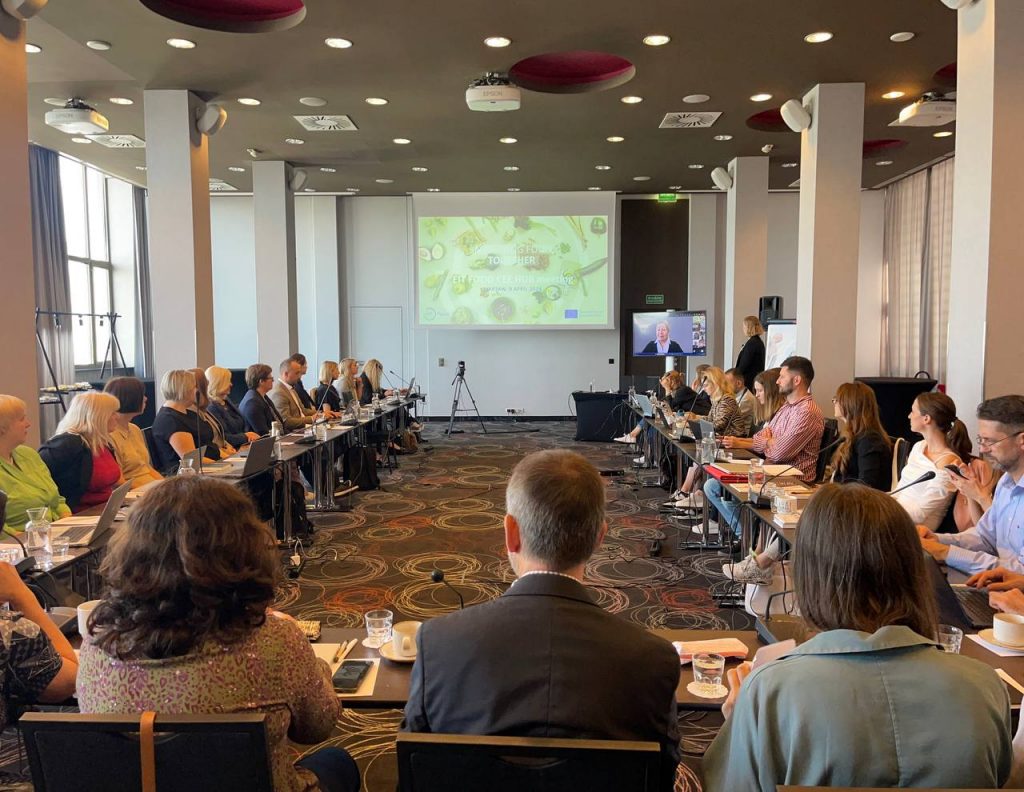
More opportunities for the agricultural and food community
The "EIT Food" community brings together research centers, business innovators, and startups under one roof. As the voice of "EIT Food" in Lithuania, we will continue to involve the agricultural and food sectors in educational programs and innovations, ensuring opportunities to develop sustainable agriculture, aquaculture, digital food traceability, circular food systems, and alternative proteins.
Looking toward a sustainable future
With increased collaborations in the food innovation sector, AgriFood Lithuania will bring more meaningful advancements. These efforts will have a real and positive impact on the local agrifood industry, steering it toward a more sustainable and innovative path.
Lithuania joins international project to test innovative plant and environmental protection system
STELLA is a new project funded under Horizon Europe Programme, aiming to develop a holistic digital system (STELLA PSS) to aid in the early warning and detection of quarantine and regulated plant pathogens and a response strategy using modern sensing technology and Artificial Intelligence.
The project aspires to advance pest monitoring and surveillance solutions, pioneer novel methodologies, and validate efficacy in real-world agricultural systems to protect plants and the environment. Throughout the project, a Pest Surveillance System (PSS) will be developed that will be consisting of three (3) subsystems:
- An early warning system harnessing novel pest forecasting models and Internet of Things (IoT) sensors.
- A pest detection system leveraging remotely piloted aerial systems (RPAS), remote and proximal sensing, citizen science, and traps.
- A pest response system furnishing geolocated hotspots for initiating containment and counteractive measures.
STELLA PSS will be tested over three years at field, farm, and regional levels across 6 Use Case Pilots (UCPs) covering arable, orchard, and vineyard crops as well as large, difficult-to-reach areas (forests). The project will focus on 8 different quarantine and regulated non-quarantine pest (RNQP) diseases, expanding across 4 European countries with different climate and geological characteristics and New Zealand.
STELLA officially kicked off on February 6th and 7th, 2024 in Athens. The kick off meeting was concluded with great success and was attended by representatives from all 14 partners from the 7 countries involved in the project.
Kristina Šermukšnytė-Alešiūnienė. From Lithuania to the EU: echoes of agrarian frustration in the heart of Europe
The storm that hit Lithuania's wintry fields has moved on to the country's capital. It is not only the dark clouds that threaten future harvests, but also the growing frustration that has been born in the heart of Europe's agriculture valleys. However, the recent increase in farmers' protests in Lithuania is more than a local grievance. We are facing a clear symptom of Europe's agrarian anxiety, which signals the serious challenges facing the farming community today.
Why are the roots of frustration among Lithuanian farmers deepening?
European Commissioner Janusz Wojciechowski, opening the Agri-Food Days 2023 in Brussels, underlined that every year we are losing more and more farms that are no longer sustainable. The statistics are really quite sad. In 2020, there were 9.1 million farms in the EU, down 37% from 2005. This means that 5.3 million farms are simply no longer there.
An unprecedented peaceful and very united farmers' protest is currently taking place in Lithuania. As in many EU countries, they have come out onto the streets. Farmers' tractors, the symbol of rural livelihoods, have become the emblem of the protest itself. The reasons for protesting are many and the specific concerns that weigh on the shoulders of those who work the land vary. But low farm gate prices, high operating costs, the relentless instability of the market and periods of crisis - the effects of the pandemic and the ongoing war - have all put many farmers in the same insecure situation.
I will come back to the number and variety of challenges facing farmers, which perfectly reflect the diverse role of agriculture in the EU's socio-economic system. For now, let us focus on the fact that the roots of farmers' frustration are getting deeper. Agricultural policy, both national and in the corridors of Brussels, is often at the heart of their dissatisfaction. I would like to stress here that the EU's Common Agricultural Policy (CAP), launched in 1962, is a partnership between agriculture and society, as well as between Europe and its farmers. It aims to support them and to improve agricultural productivity by ensuring a stable supply of affordable food.
Its objectives include protecting Member States' farmers so that they can make a reasonable living, helping to combat climate change and sustainably manage natural resources, preserving rural areas and landscapes across the EU, and keeping the rural economy alive by boosting job creation in agriculture, the food industry and related sectors.
Although the CAP is a pillar of EU integration, it has its critics. Subsidy distribution, bureaucratic confusion and a perceived gap between politicking and practice are among the repeating themes in the list of reasons for farmers' frustration.
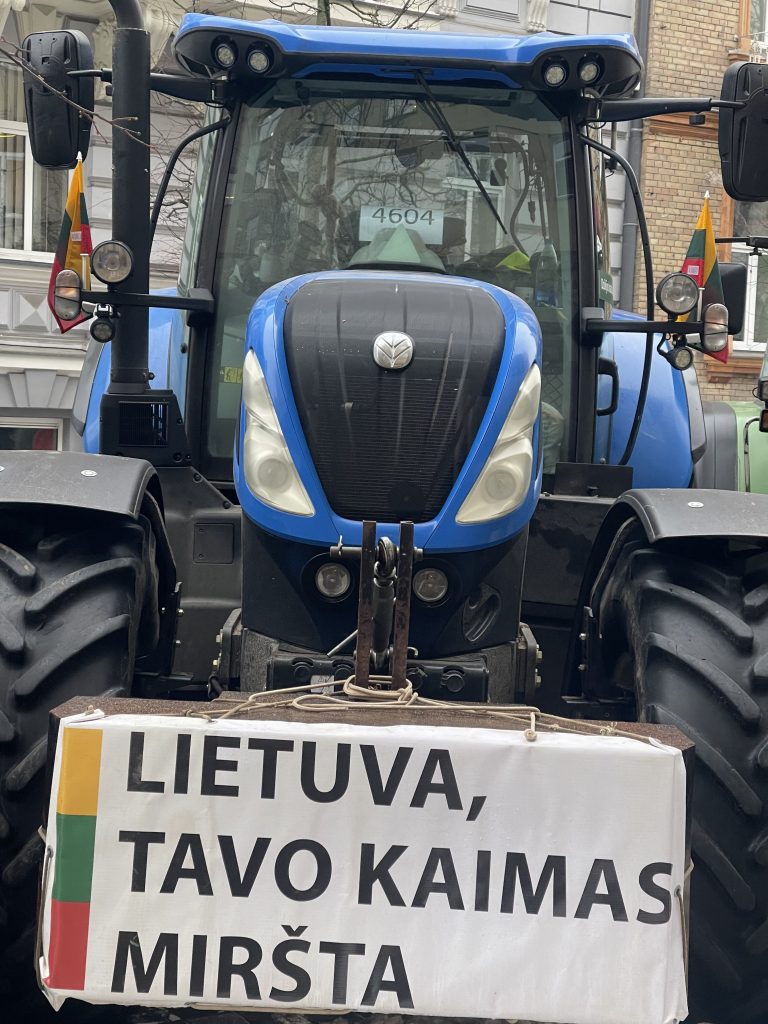
European farmers are not just the backbone of the food supply chain
In recent years, especially since 2019 (or the launch of the Green Deal), farmers' protests have increased in the EU, with strong organisation and large numbers of participants. Significant demonstrations have taken place in countries such as the Netherlands, Germany, France, Poland, Spain or Italy.
These protests have been motivated by a wide range of interlinked issues. Economic pressures, such as low producer prices and unfair competition, as well as challenges related to agricultural policy, in particular the complexity and inequality of the CAP. Environmental rules, undoubtedly crucial in the face of climate change and the loss of biodiversity, are nevertheless confusing in the maze of requirements. Farmers, the guardians of the vitality of Europe's countryside, are often 'stuck' between environmental sustainability provisions and the realities of agricultural production.
The recent protests in the Netherlands, prompted by measures to reduce nitrogen emissions, illustrate this tension - the delicate balance between preserving nature and sustaining livelihoods. Environmental regulations aimed at reducing emissions and promoting sustainability are being contested. Farmers argue that the practical aspects of farming and economic sustainability are often ignored.
The protests also echoed the call to respect and re-evaluate the role of agriculture in society, highlighting the need for an inclusive dialogue between policy makers, society and the farming community. The overarching objective is to comprehensively address the multiple challenges of modern agriculture and ensure a sustainable and prosperous future for all stakeholders.
Recognising the indispensable role of farmers is, at the very least, essential. They are not only the backbone of the food supply chain but also the custodians of our lands and traditions. Their hard work and dedication is the foundation on which food security is built, and farmers' well-being is therefore synonymous with the health of society as a whole.
Protests are not just a cry for economic aid or policy reform. They ask for recognition and respect. Farmers are not just food producers - they are also preservers of cultural heritage, pioneers of innovation and defenders of the environment. But the public perception that such a multifaceted role often does not match expectations fosters a sense of marginalisation.
The solution: a future shaping policy based on community realities
The response to agrarian frustration is not a simple one. It requires an integrated approach that recognises the concerns of the farming community while addressing the broader challenges of sustainability, economic viability and social justice. A constructive dialogue involving all stakeholders is key. Policy makers, farmers, industry actors and civil society need to come together to develop policies that are not only fair and forward-looking, but also based on the realities of farmers' lives.
Investment in rural infrastructure, support for sustainable practices, fair trading conditions and genuine cooperation with the agricultural sector are just some of the steps that can pave the way. The EU's commitment to food security, rural development and environmental sustainability is the policy basis on which these actions can be taken. Of course, the path would not be easy and would require a joint effort, a shared vision and a basic willingness to adapt and innovate.
The echoes of agrarian frustration will spread from Lithuania to the far corners of the EU. Let us therefore remember that the health of European agriculture is inseparable from the health of society, the economy and the environment. Addressing the challenges facing farmers is not just about addressing the turbulence in the sector. It is about nurturing the very roots of Europe's prosperity and sustainability. The fields of Lithuania, and indeed of Europe as a whole, are not just farmland, but the horizon of a healthy life, where the seeds of a sustainable and inclusive future must be sown with care, understanding and respect. Recognising the vital role of farmers, we are building a sustainable future for all.
Women In Agrifood Summit 2023 in Lithuania: joint forces are the key to tackle global issues
Last week, Lithuania hosted the inaugural Women in Agrifood Summit 2023 at Talent Garden Vilnius, marking a significant stride in the transformation of the agrifood landscape. Organized by the EIT Food and facilitated by AgriFood Lithuania DIH, the conference served as the culminating event for the 4th edition of the EIT Food Empowering Women in Agrifood (EWA) programme, bringing together 16 exclusive speakers leading in their fields and 11 innovative women from all over the Europe committed to fostering a balanced evolution in the industry.
Throughout the summit, participants with an interest in agriculture, food, technology, and business had the opportunity to hear from top level experts in their field. Engaging in critical discussions, these professionals explored how collaboration between genders can positively impact the future of the business.
The Walks of EWA Fame featured 11 mentees from this year’s EWA program. Women leaders and founders of agri-food startups from Poland, Estonia, Ukraine, Serbia, Slovenia, Greece, Italy, Portugal, Spain, Turkey, and Romania showcased their innovative ideas and success stories. On-site attendees at the workshops focused on developing skills and exchanging insights on current challenges in the agrifood sector. The Women In Agrifood Summit also served as a platform for the women to develop valuable connections with potential partners.
Opening speeches, keynote presentations, and panel discussions in the event under the theme “Balance for the Future: Why Food Systems Need Balance and What Does It Really Mean?” echoed a key message. Achieving future balance in the agrifood sector requires an interdisciplinary approach and collaboration if we want to produce outcomes with added value on a global scale.
The director of the EIT Food North-East, Marja-Liisa Meurice, set the tone for the day with a strong reminder that empowering women and bridging the gender gap in the agrifood system isn’t just about statistics; it’s about enhancing the well-being of women, their families, and, by extension, the entire society.
“Current and future EWA alumni on the journey towards a more inclusive and empowered agrifood sector become part of a supportive network within the realm of food innovation. With over 360 EWAs contributing to this transformative initiative over the years, today’s gathering is a testament to the growing strength of our EIT Food community and the achievement of the goal to create an agrifood ecosystem where all its key elements – science, economics, social and diverse sustainability, and circularity – are well-balanced,” she said in her welcoming words.
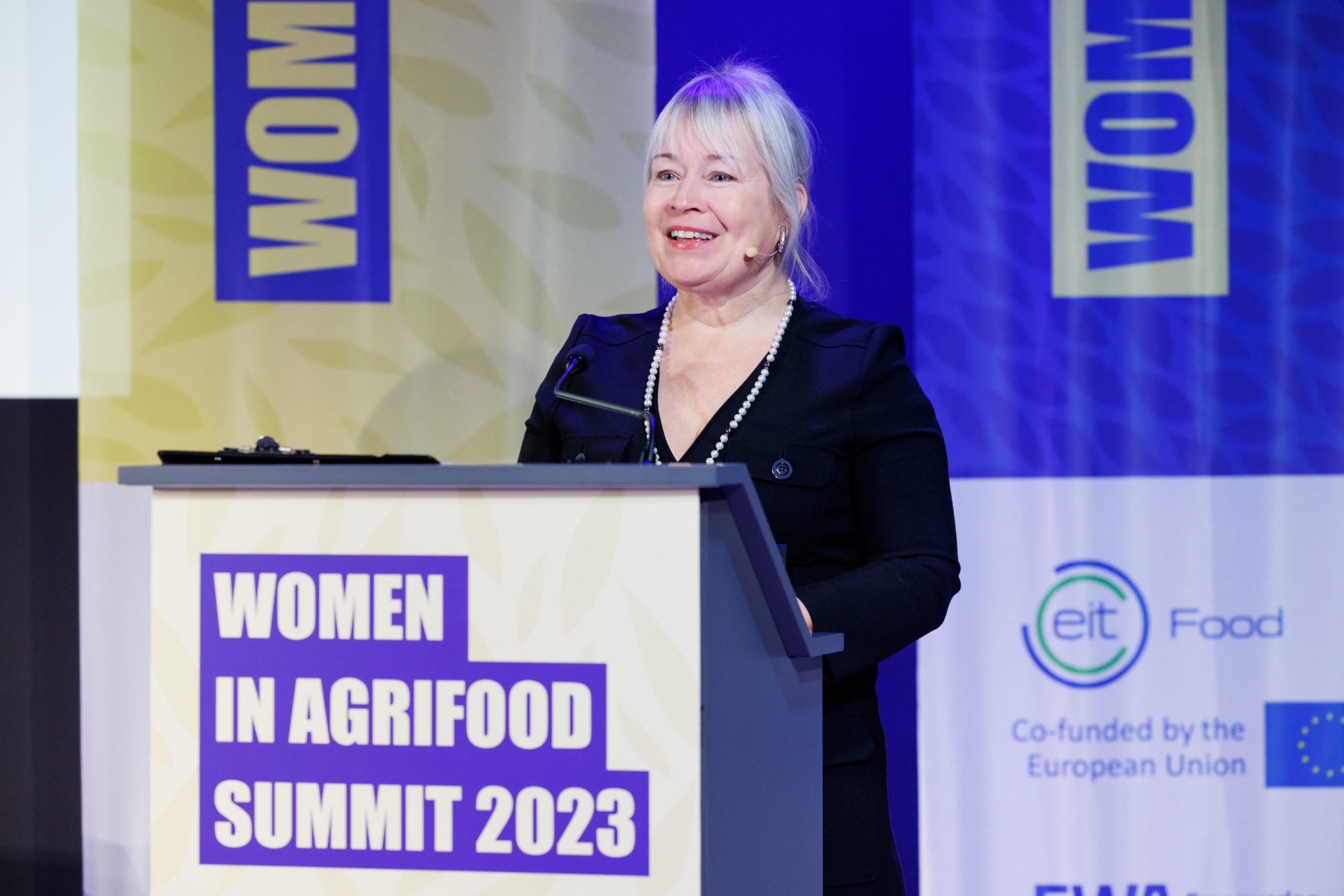
The CEO of AgriFood Lithuania DIH and a patron of the Lithuanian EWA programme, Kristina Šermukšnytė-Alešiūnienė, delivered an empowering opening speech, stating that a robust ecosystem rooted in a solid foundation not only elevates individual member states but enriches the collective experience for us all.
“Despite being the least digitalized and traditionally conservative, the agrifood industry holds unparalleled potential for transformation, as validated by scientific insights. Ladies, this is your opportune moment, your rightful place to innovate and redefine norms because the ability to cultivate a robust ecosystem and foster balance is ingrained in your DNA. And don’t forget, innovation is not only about creating something entirely new; it’s also about using the ecosystem or existing tools in a new way,” she emphasized.
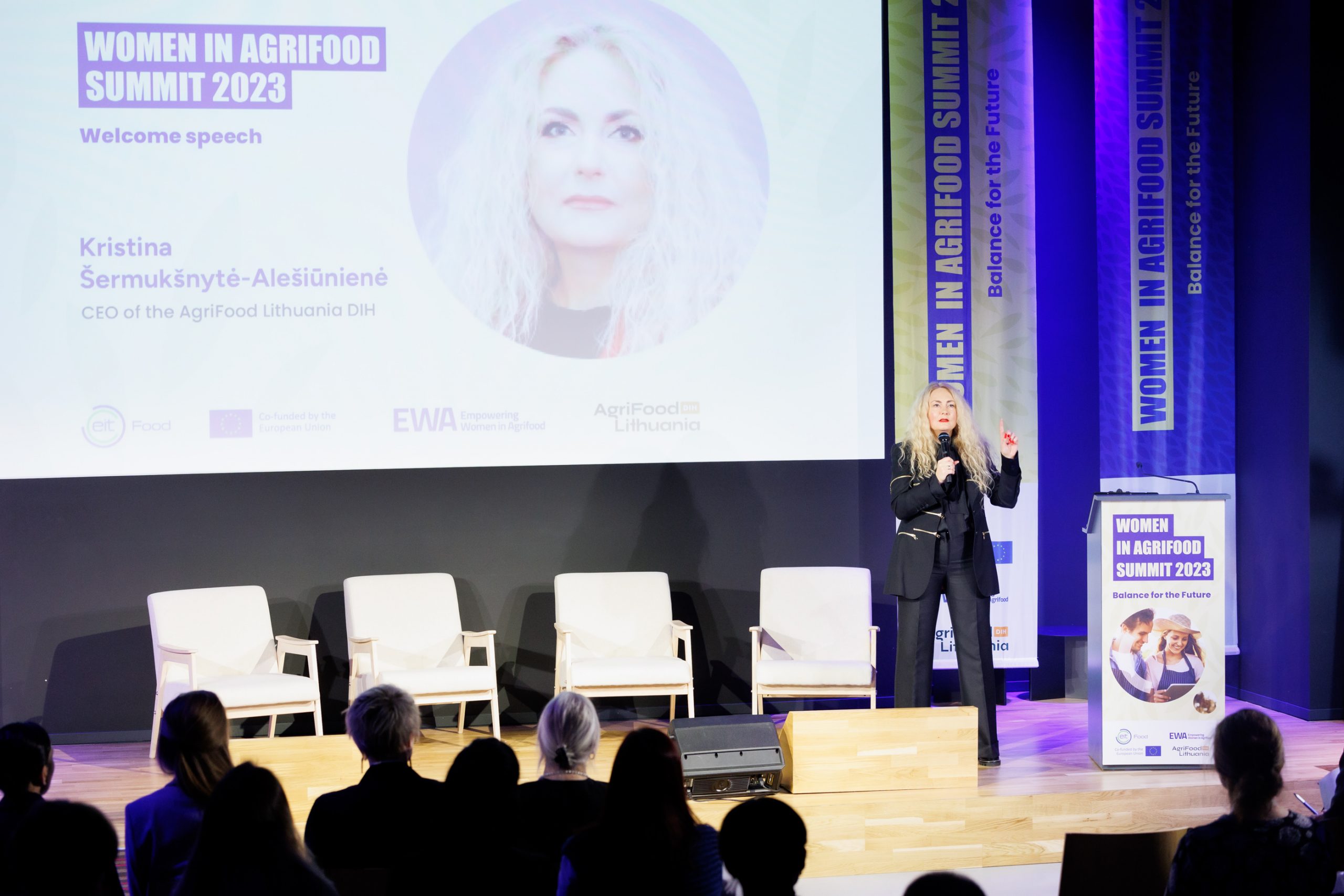
According to Agnieszka Wojdyr, a policy officer from DG GROW at the European Commission, organizations with a value for inclusion are six times more innovative and agile and eight times more likely to perform better business results than those with a less diverse culture. However, the impact of diversity is much bigger than that of finance.
“The Commission’s Gender Equality Strategy for the period 2020–2025 stands as a beacon of commitment, reinforcing our dedication to spearheading an equality perspective on a global scale. By addressing gender disparities and fostering inclusivity, we strive not only to transform organizational landscapes but also to contribute significantly to the broader societal narrative, advancing a more equitable and just world for all,” said the policy officer in a thought-provoking keynote speech, stressing the significance of diversity in addressing the planet’s challenges, which is more crucial to invest in than ever.
The panel discussion focused on various pragmatic solutions to achieve gender balance in the agrifood sector from diverse angles and discussed how to shape its future. One of the most prominent summarizing insights was the untapped potential of women leaders in Europe to build an innovative and entrepreneurial ecosystem, identified in recent years.
To advance sustainably, we must leverage the wealth of these talents. Yet, empowering women alone is insufficient within a flawed system. The agrifood sector, integral to both challenges and opportunities, offers a pivotal point for transformation. By collectively addressing pressures on the agrifood sector and reevaluating our relationship with food, we hold the power to elevate women’s status. This transformative shift extends beyond gender empowerment, embracing a holistic societal redefinition. Through collaborative efforts, it becomes possible to propel comprehensive change, enabling women’s full workforce participation and contributing significantly to global prosperity.
K. Šermukšnytė-Alešiūnienė: "This year's Forum outlines a vision for the agri-food industry's future"
The largest international AgriFood Forum 2023 in the Baltic States has come to an end. This year's event was unique for its broadest concept and impact, the largest delegation of extraordinary speakers, and additional events. The ambition to bring the Forum up to date for all related industries was reflected in the programme, which took place in four halls of Vilnius Town Hall, where over 60 Lithuanian and foreign experts shared their insights. Around 250 forum participants expressed their interest in engaging in meaningful discussions and valuable networking, while more than 2000 people from different countries watched the live streaming of the event.
The opening served as a reminder of the importance of joint efforts
The fifth AgriFood Forum was launched with a welcome speech by the Commissioner for Agriculture, Janusz Wojciechowski. The representative of the sector's most important policymaker highlighted the priority of actively supporting the development of rural areas and the empowerment of the communities living there, which will ensure the sustainable growth of the European Union. He also welcomed the cross-institutional, cross-disciplinary focus on finding innovative solutions for the future. In the view of both the European Commission and major networks such as EIT Food and Business at OECD, partnerships remain a key factor in achieving real change.
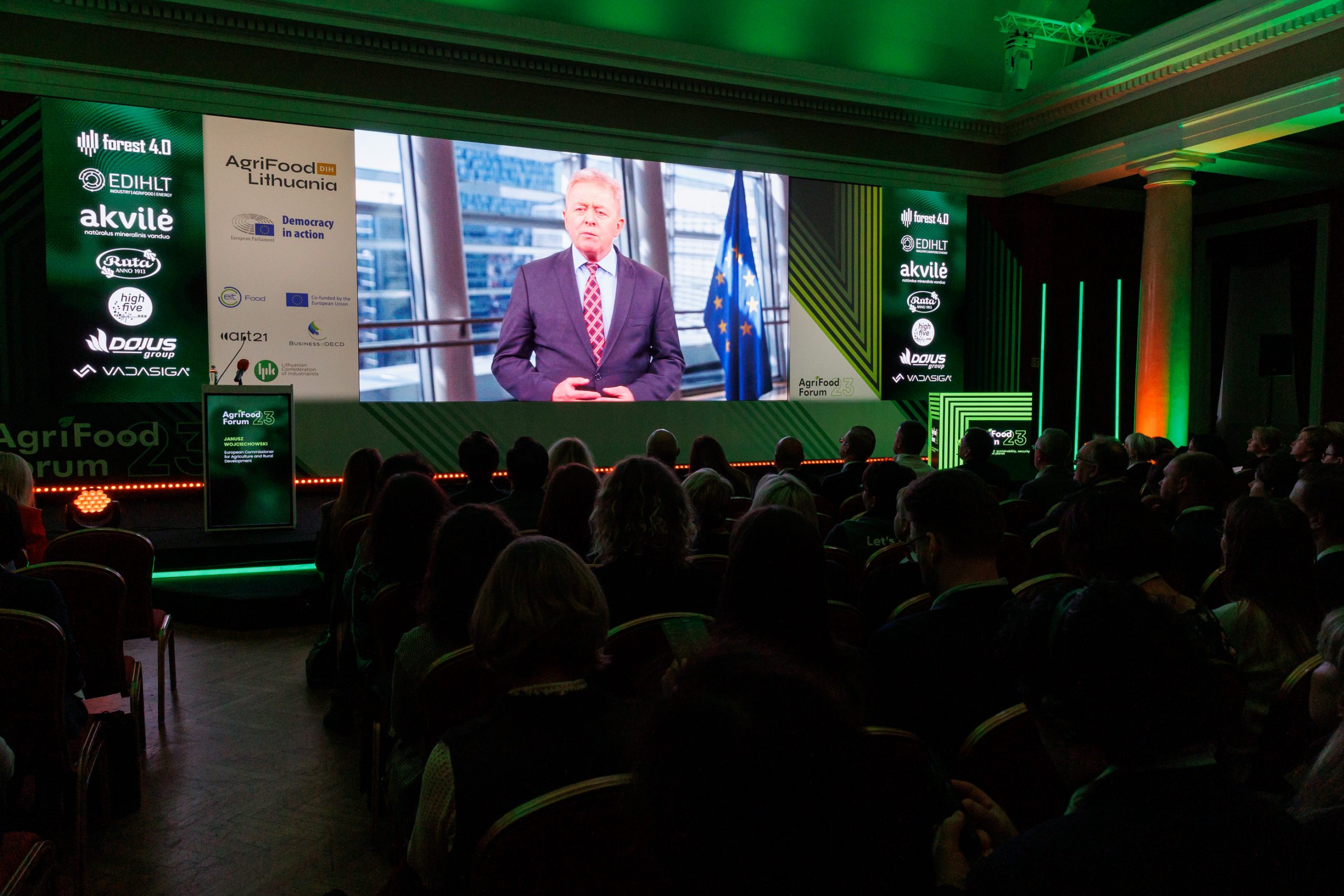
Metin Akman, Chair of Business at OECD's Food and Agriculture Committee, recalled that AgriFood Forum 2023 echoes the mission of the global Peace for Food initiative launched last year, which focuses on tackling the multi-layered crisis affecting food supply and demand: "Together, we can feed the world, build sustainable food supply chains, and ensure food security," he said.
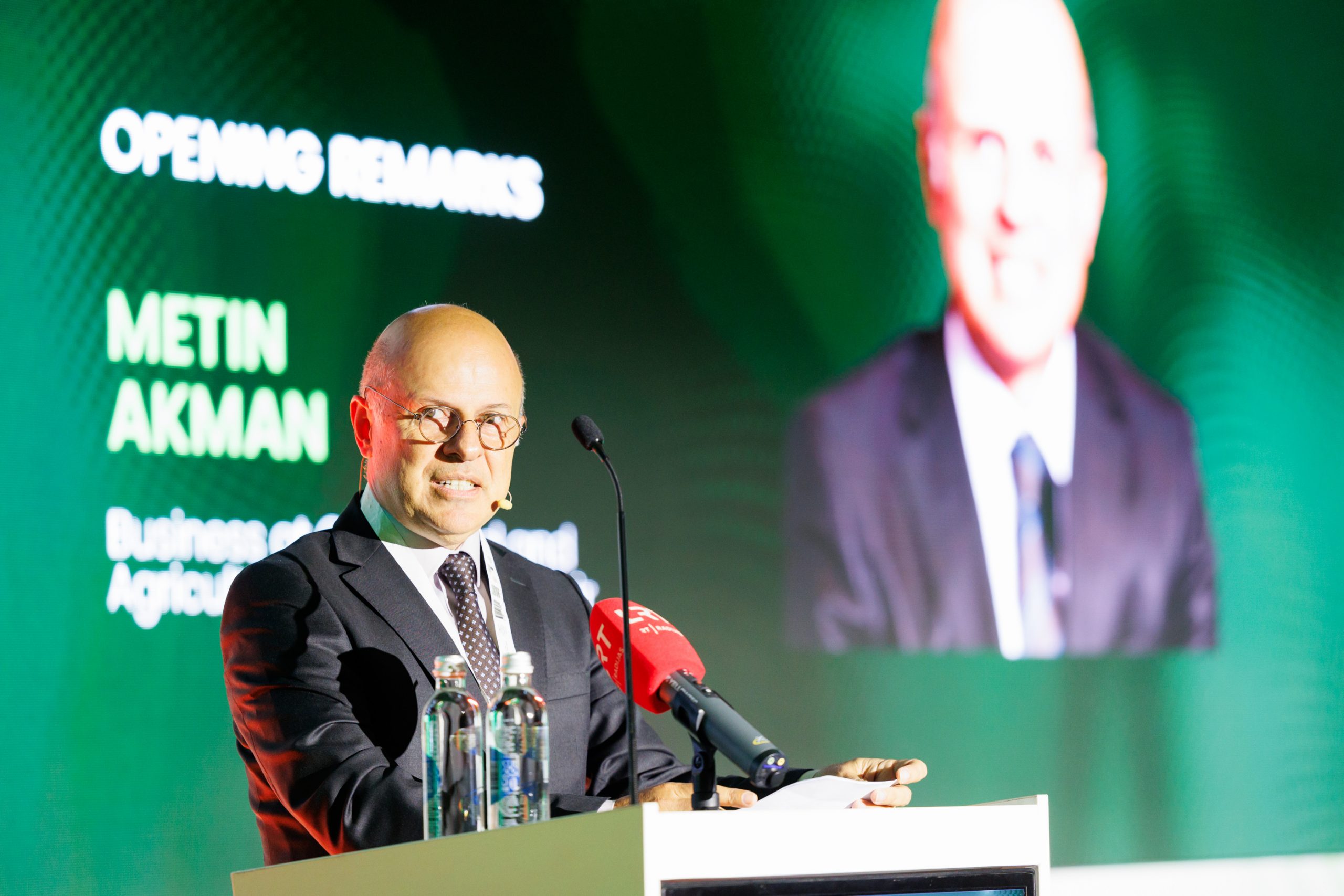
Dr. Andy Zinga, CEO of EIT Food, looked back at agriculture as a key human invention that has become the driving force behind the growth of civilizations. Early innovations such as food drying, pasteurization, and fermentation have opened up new routes for the exchange of food, and this required collaboration and trust.
"This is also the basis for today's mission to build resilience in food systems threatened by wars and ecological disasters. A sustainable food industry can indeed lead to equitable transformation, but it needs a systemic approach and a joint effort in project development. Developing innovations always carries some risk of failure; it is the trust between consortia and the open exchange of knowledge that allows learning, not being afraid to make mistakes, and discovering solutions that make a real impact," emphasized Dr. Andy Zynga.
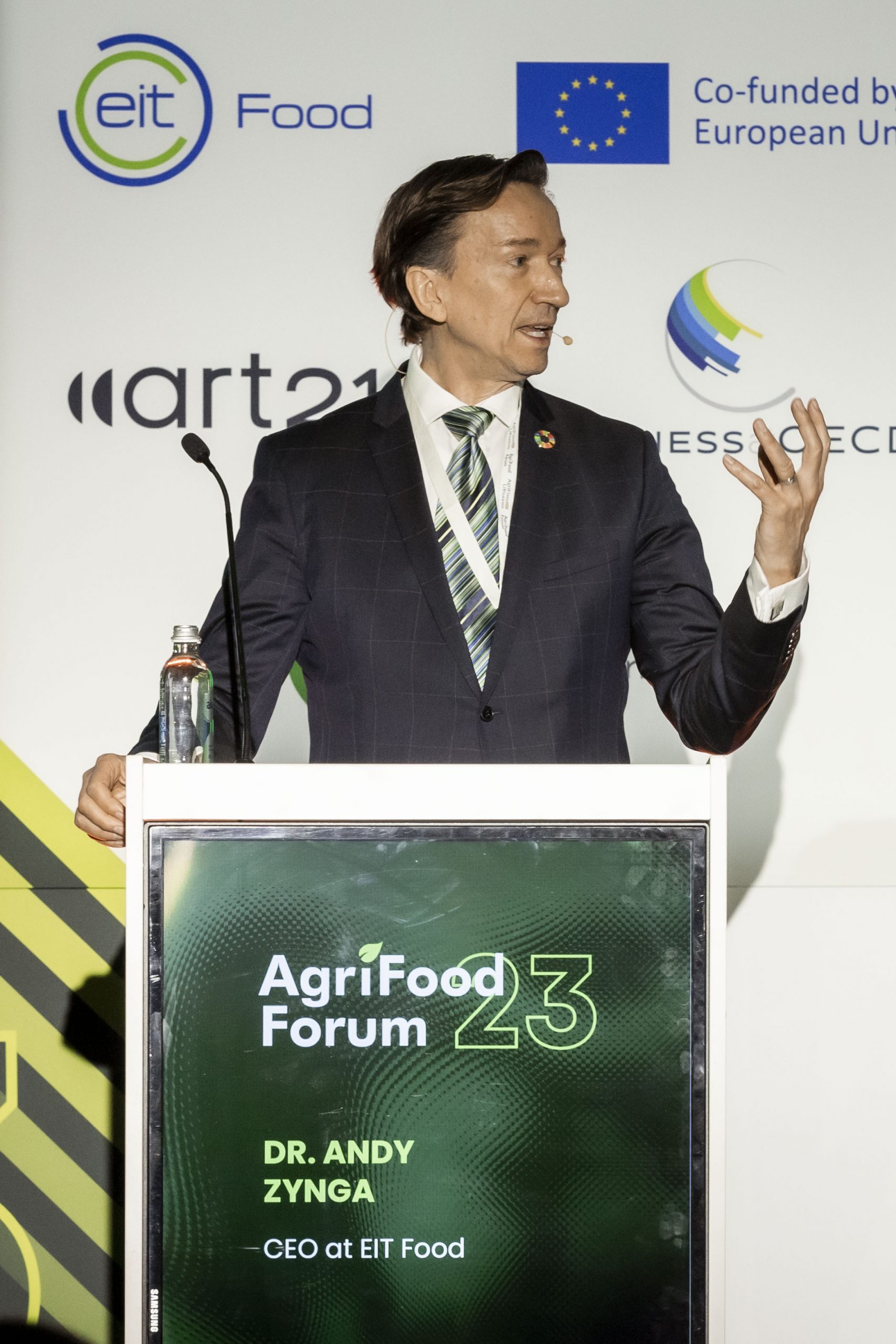
According to Simonas Gentvilas, Minister of Environment of the Republic of Lithuania, agriculture and food systems are some of the most vulnerable when it comes to the direct consequences of climate change extremes, and it is the agri-food sector players who are in the first line of action to address the challenges. This includes food security in areas that will be uninhabitable in the future, whether due to desertification, harmful emissions, or declining infrastructure.
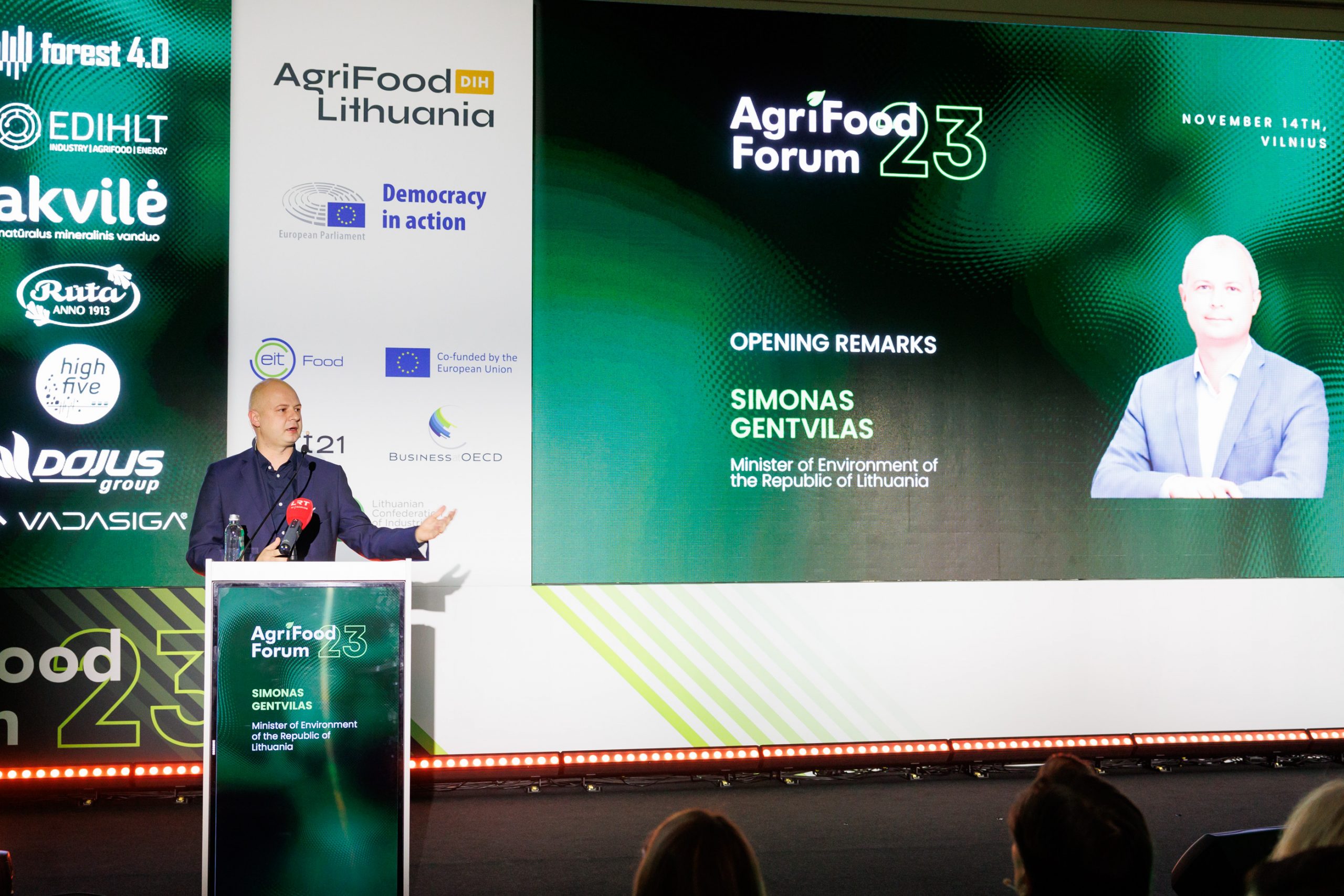
Revealed the real idea behind the theme of the event
The opening high-level panel discussion gave impetus to the fruitfulness of the AgriFood Forum 2023. In addition to the CEO of EIT Food, President of the Lithuanian Confederation of Industrialists Vidmantas Janulevičius also took part in the discussion, as did Kristina Šermukšnytė-Alešiūnienė, CEO of AgriFood Lithuania, the cluster and digital innovation hub organizing the event together with partners. Julia Nielson, Deputy Director of the OECD Directorate for Trade and Agriculture, and Vytenis Tomkus, Vice-Minister at the Ministry of Agriculture of the Republic of Lithuania, also shared their insights.
Looking for both direct and indirect ways to ensure stability in the world, the experts explored the links between food, peace, and security. Through real examples of sustainable farming practices and supply chain optimization, they analyzed trends in the sector and stressed the value of national and global communion in sharing knowledge, resources, and best practices. Building the framework of the 2040 vision and taking a critical look at potential new barriers to achieving the goals of a resilient tomorrow were not left untouched.
"Despite the official theme of this year's Forum, the future was at the heart of the event, and it is not a reality without communion and networking. While I sincerely believe that the event, which has become an increasingly important tradition, generates valuable new partnerships every year, we should not forget that it is not just about talking. It is only by taking action that we can change the way we and society think and create a better world. That is why we plan to prepare a thorough policy paper after the forum, capturing the practical recommendations we have developed this year on the way forward. And of course, I would like to thank all those who have helped to take a bigger than ever step towards a common future: the insightful speakers and dynamic panelists, the engaging audience, and the organizing team," said K. Šermukšnytė-Alešiūnienė.
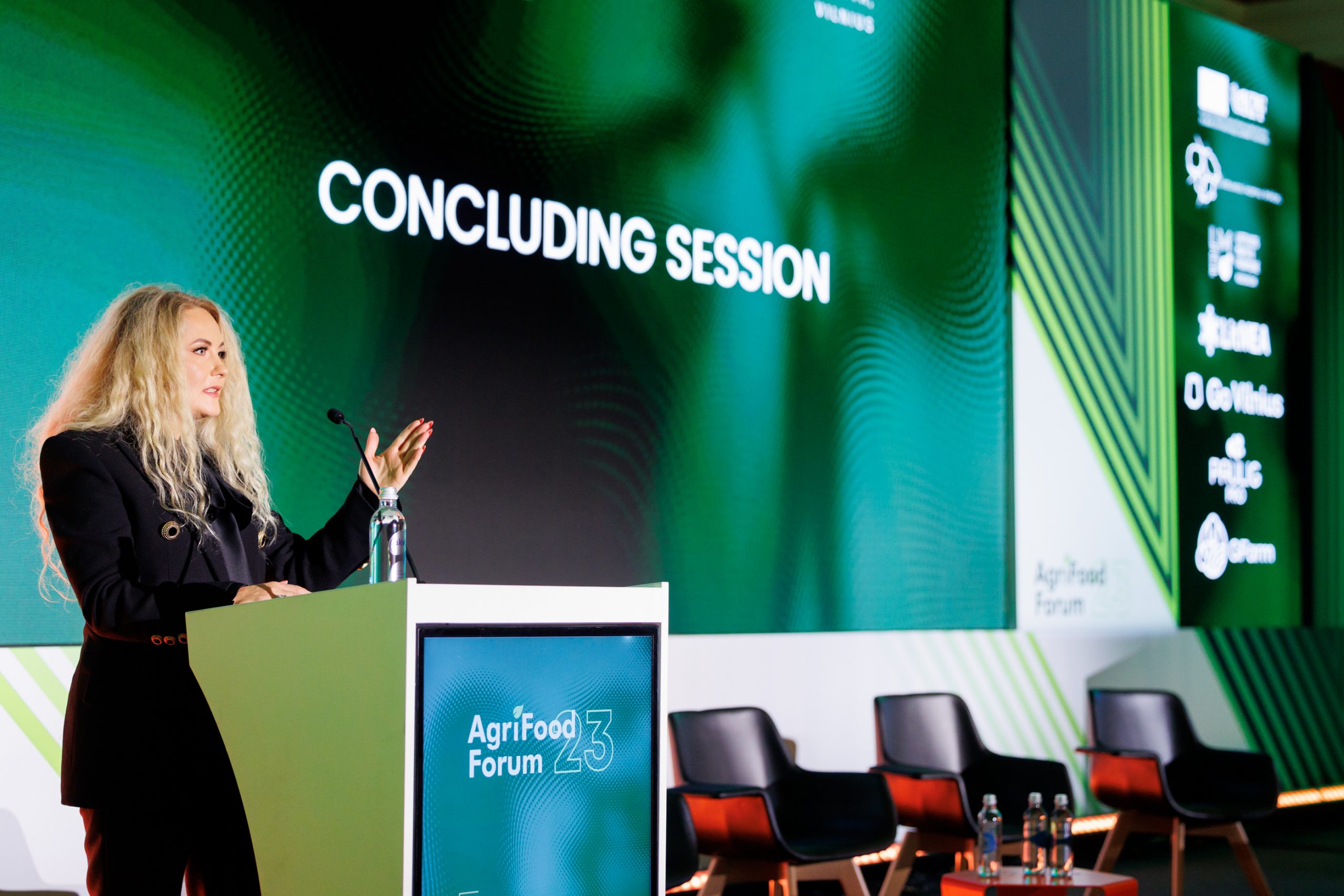
The AgriFood Forum 2023 and the growing collective responsibility to improve the situation on the planet were marked by a symbolic gesture. Together with Life Terra, one of Europe's most active climate change initiatives, and other partners, 300 birch trees were planted in Pavilnys before the event. On the day before the forum, Business at OECD also held an official meeting of the Food and Agriculture Committee. This was the first time that its representatives, who usually hold their meetings at the organization's headquarters in Paris, had gathered in Lithuania. Until November 15, C2Lab, initiated by the European Cluster Cooperation Platform, took place, where organizations from different industry clusters, companies, and research organizations from all over Europe came together in consortia to develop mutual business ideas.
New and promising ideas for a more sustainable future at the C2Lab in Vilnius
On 14-15 November 2023, the European Cluster Collaboration Platform, in collaboration with AgriFood Lithuania, celebrated the fourth Cluster Collaboration Lab (C2Lab) in Vilnius, Lithuania. The workshop took place next to the AgriFood Forum, the largest forum on agri-food in the Baltic Region. The C2Lab supported the creation of new collaborations between the participants coming from Lithuania, Latvia, Hungary, Sweden, Finland, France, and Spain. They developed ideas to address the application of digital technologies for traceability in the agri-food sector, food waste, sustainability of agri-food value chains, sustainable energy, wood and furniture, and collaboration through networks, among others.
Among speakers: representatives of the EC and experienced Lithuanian and foreign clusters
The C2Lab was opened by Romualda Stragienė, Director at Innovation Agency Lithuania. She spoke about the achievements of the Lithuanian innovation ecosystem and the lack of globalness and cooperation which they try to address with events such as the C2Lab. Following her, Giedrius Bagušinskas from the Smart Food Cluster and Marta Batalla from DG GROW, European Commission, highlighted the need for importance of meeting the right people for future collaboration and the openness in the discussions to create business through clusters.
Athanasios Konstandopoulos, Chief Scientific Advisor of CHORUS, set the tone for this C2Lab by presenting the policy framework and challenges of the agri-food ecosystem. The EU Farm to Fork Strategy offers many opportunities for action to tackle the well-known challenges, which include climate change, water scarcity, soil degradation, increasing food prices, increasing demand for food, rise of antibiotic resistance, spread of zoonotic diseases, and loss of biodiversity.
With having resources available, now it is the right time to develop new projects. The current areas of research, development, and innovation are mainly centered around climate-smart agriculture, water-efficient agriculture, soil health, resilient food systems, sustainable aquaculture, precision agriculture, and alternative proteins. To establish the projects, A. Konstandopoulos presented the "Resource NEXUS" as an essential framework, focussing on sustainability and resilience. We must develop a holistic approach to address the challenges, bringing together talent, culture, regulations, density, and capital at the same time. In addition, we must search for synergies in multiple domains, namely education, research, innovation, and entrepreneurship.
Looking at potential funding sources for the project ideas, Marta Batalla from the European Commission gave an overview of EU programmes. She highlighted the key European priorities of the green and digital transition and building resilience as the basis for all funding programmes. The EU direct management programmes that are of particular interest of clusters are Horizon Europe (pillar II and pillar III), European Agricultural Fund, Single Market Programme, Programme for the Environment and Climate Action (LIFE), and the European Insititute of Innovation and Technology (EIT). The specific calls can be found on the EU Funding and Tenders Portal, the Cohesion Open Data Platform, and “Access to EU Finance” on Your Europe. She encouraged the participants to explore the different opportunities and pay attention to the call guidelines in order to submit a successful proposal.
Going deeper into Horizon Europe, Aiga Jonele from the National Contact Point of the Research Council of Lithuania gave a compelling speech about why the programme is for everyone. The National Contact Points, which are well-established networks in the Member States, work to reduce the stereotypes about Horizon Europe and give advice on administrative procedures. They can give personalized support and assistance on proposal writing. She highlighted the opportunities in the lump sum schemes, which are helpful simplification of the funding scheme. Viktorija Misėkaitė, advisor at the Ministry of Economy and Innovation of Lithuania, added on the usefulness of Horizon Europe. She explained how ERDF funds are being transfered to Horizon Europe to encourage greater participation, use the advantage of opportunities available for R&D&I, and have a holistic approach to foster innovation and ensure a critical mass of sustainable and uninterrupted flow of funding.
Develop clear ideas leading to practical results
After these inputs, the work on project ideas began. The participants formed eight groups on different topics related to agri-food, wood and furniture, energy, and networks. Each group was guided by a facilitator with experience in project development. They stirred the discussions to find synergies among the people in the groups and to determine a common goals that can unite them for new collaborations.
Groups started their work in the late afternoon and continued the whole morning on 15 November. As the last agenda point of the lab, each group presented their results to the plenary. Now, the ball is in the court of the participants to further develop these initial results and continue their newly founded collaboration. “C2Lab is a very good possibility to meet new people and prepare ideas for future proposals and cooperation”, said Armands Lejas-Krumins from Food Products Quality Cluster. “We have developed a great idea to address food waste, and we will continue our meetings in the next weeks and months to achieve concrete results. I hope this format will continue in the next years.”
Kristina Sermuksnyte-Alesiuniene from AgriFood Lithuania concluded: “In the agri-food industry, which is rife with shifting opportunities and challenges, C2Lab served as a model of collaboration and innovation. With the AgriFood Forum and this lab taking place in Vilnius, our attention is increasingly directed towards the development of influential initiatives and cross-border value chains. This C2Lab serves more than a gathering spot; it is a furnace in which concepts are refined into actionable plans. This event represents a dedication to revolutionizing the agri-food ecosystem through the utilization of the combined expertise of clusters, SMEs, policymakers, and innovators. As a collective, we are delineating a trajectory towards an agricultural sector that is robust, environmentally conscious, and affluent, thereby emphasizing the critical importance of agriculture to our societies and economies. May we seize this occasion to effect concrete change by capitalizing on the potential of cooperation to establish an environmentally conscious and groundbreaking future in the agricultural sector and other domains.”


